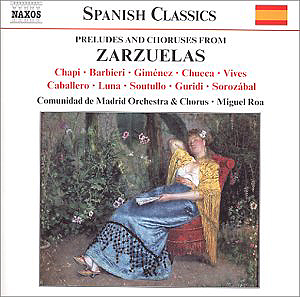Zarzuela,
that mélange of theatrical flavours, lent its name
centuries ago to a Spanish stew made from morsels of assorted
fish. The word has since come to be applied to almost any sort
of tasty mixture, so perhaps it is fitting that many compilations
of romantic zarzuela music consist of just such succulent odds
and ends.
For
this, their welcome first attempt at cocina zarzuelera,
Naxos would have been forgiven for sticking to popular meat and
potatoes; but in the event their choice of ingredients is pleasantly
unhackneyed. Yes, we do get some of the most popular Preludios
and Intermedios, well marinated and stylishly presented;
but the addition of a chorus gives conductor Miguel Roa - pre-eminent
zarzuelero of our day - a chance to toss in some more exotic
fare, such as the Coro de doctores from El rey que rabió,
and the piquant Ronda de enamorados (Lovers’ Round) from
La del soto del parral.
Barbieri
is represented, inevitably, by a piece from his well-loved El
Barberillo de Lavapiés; but the choice falls on a less
familiar number, the wistful, coy "Goldfinch Song" of
the seamstresses. The distinctive aroma of Basque music graces
the pot, too, through the inclusion of Guridi’s proudly rhythmic
Preludio to Act 2 of El caserío. Like all
good chefs, Roa rounds the dish off with a refreshing salad from
Sorozábal, Spain’s answer to Kurt Weill; not one of his
pot-boilers, but the lively Ensalada (‘salad medley’) of
popular Madrid tunes from Don Manolito.
Conductor,
musicians and singers score high for culinary execution as well
as planning. The orchestra sounds just the right size for a pit
band, playing with natural, unforced spontaneity without jeopardising
technical precision. Compared against the classic LP versions
of the Preludios under Argenta, Frühbeck de Burgos
and Sorozábal himself we maybe feel a soupçon
of citric zest has gone missing, but Roa’s crispness of attack
combines well with the clarity of the brand new Naxos recording.
It’s a pleasure to appreciate so much detail of these composers’
oft (and wrongly) maligned scoring.
A
treat, then, to please even the most fastidious zarzuelero.
But I have to report one fly in the soup. The CD will have a wide
currency, and it’s a pity that so many English-speaking newcomers
must be warned off Keith Anderson’s clumsy translation of Manuel
García Franco’s notes. To define zarzuela as "Spanish
musical comedy" is a bad enough beginning, reinforcing snobbish,
critical ignorance about a varied and sophisticated art form;
but to go on to say that Gaztambide, amongst other more likely
suspects, "lacked the technical resources to create anything
of value" turns Franco’s milder criticism into a bald untruth.
A baffling reference to El tambor de granaderos being "one
of the best examples of the style of Alicante" is cleared
up by reference to the Spanish, which means "one of the best
pieces by the musician of Alicante" (i.e. Chapí).
Not that Franco himself is free from odd lapses of his own - criticising
the "feeble plot" of a work curiously Englished as The
Couple of L’Africaine (Which most of us may know better as
The Duet from L’Africaine) won’t do, for Echegaray’s libretto
is certainly one of the most brilliant farces in the repertoire.
Well,
one little fly scarcely spoils so generous a helping. As for the
contents themselves, there’s little to add but "Please sir,
I want some more!"
Christopher
Webber



 Comunidad de Madrid Orchestra
and Chorus/Miguel Roa
Comunidad de Madrid Orchestra
and Chorus/Miguel Roa  NAXOS 8.555957 [64.34]
NAXOS 8.555957 [64.34]